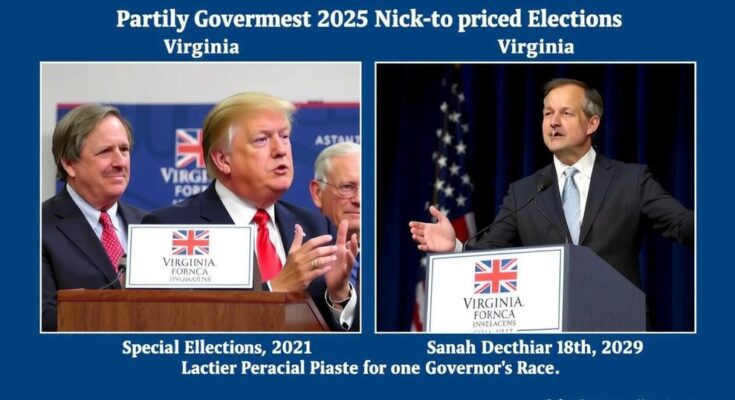The special elections in Virginia are a pivotal test of party strength ahead of the 2025 gubernatorial race, reflecting voter sentiment post-general election. Key contests in the 32nd and 10th Senate Districts highlight the stakes for both parties, particularly regarding significant issues like reproductive rights and educational funding, with outcomes bearing implications for future state policies.
Virginia’s special elections serve as a barometer for party strength ahead of the 2025 gubernatorial race. With Republicans looking to consolidate power in Congress and the White House, these elections are critical for sensing voter sentiment since the general elections held on November 5. The results could either strengthen Democratic control in the state legislature or indicate a burgeoning Republican momentum heading into the gubernatorial contest.
In the 32nd Senate District, Delegate Kannan Srinivasan (D-Loudoun) is contesting to keep the seat for Democrats against Republican Tumay Harding, following the vacancy left by U.S. Rep-elect Suhas Subramanyam’s shift to Congress. The 26th House District features J.J. Singh (D) competing against Republican Ram Venkatachalam to succeed Srinivasan. The significance of these races has attracted substantial national attention and investments from the Democratic Legislative Campaign Committee.
The 10th Senate District became another focal point as Democrat Jack Trammell faces GOP nominee Luther Cifers to fill the seat left vacant by former state Senator John McGuire (R-Goochland). Given that over 60% of voters in this district previously supported President Trump and nearly 70% backed Governor Glenn Youngkin, Cifers is perceived as the likely victor in this Republican-leaning area.
Moreover, the presence of a $2 billion surplus has intensified discussions among Virginia lawmakers regarding budget priorities, with Democrats emphasizing funding for K-12 education and regions of bipartisan interest aiming for tax relief for workers. Reproductive rights have also emerged as a pivotal issue in these elections. Democratic candidates Srinivasan and Singh advocate for protecting abortion access; in contrast, Republican Venkatachalam remains ambiguous on his stance, while Harding asserts her support for reducing the necessity of abortions claiming life begins at conception.
In the 10th District, Trammell endorses a constitutional amendment to safeguard abortion rights, whereas Cifers maintains a strict anti-abortion position without exceptions. The Democratic majority in Virginia’s legislature is deemed crucial for progressing this constitutional amendment, which would amplify their push for reproductive rights amid a national backdrop where abortion continues to be a divisive factor. Following the U.S. Supreme Court’s decision to overturn federal protections in 2022, abortion issues have taken a prominent role in state and national dialogues, influencing legislative measures in various states.
This article delineates the importance of Virginia’s special elections as critical indicators of party strength leading into the gubernatorial elections of 2025. With Democrats currently holding the majority in the state legislature, these elections will test their viability against a rising Republican presence, especially as sentiments shift in light of a new presidential administration. Key races, notably in the 32nd and 10th Senate Districts, underscore the contentious nature of this electoral period, with significant implications for policies, particularly concerning reproductive rights and educational funding. The outcomes may establish a political trajectory ahead of the important gubernatorial race, reflecting broader national trends in politics.
In summary, the special elections in Virginia represent a crucial moment for both the Democratic and Republican parties as they seek to assert their influence before the 2025 gubernatorial race. The election results will likely indicate voter sentiment and party strength within the state, particularly regarding pressing issues such as education funding and reproductive rights. With significant national interest and investment in these contests, the landscape of Virginia politics may shift substantially depending on the outcomes of these races.
Original Source: virginiamercury.com




